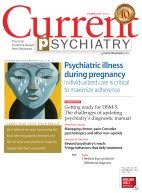Wednesday, April 1, 2009
Clinical guide to countertransference: Help medical colleagues deal with ‘difficult’ patients
Philip R. Muskin, MD
Professor of clinical psychiatry, Columbia University College of Physicians and Surgeons, Chief, Consultation-liaison psychiatry, Columbia University Medical Center, Faculty, Columbia University Psychoanalytic Center for Training and Research, New York, NY
Lucy A. Epstein, MD
Postdoctoral clinical fellow in psychosomatic medicine, Columbia University College of Physicians and Surgeons, New York, NY
Two strangers meet in the hospital cafeteria. Mrs. R, an elderly woman, asks Dr. W, a first-year medical resident, for help in getting a bottle of soda from the cooler. Afterward, Dr. W comments to a colleague with whom she is having lunch, “That woman reminds me of my grandmother.”
What does that comment reflect about Dr. W? It is a statement about the doctor’s transference. That is, she is aware of elements about Mrs. R that evoke internal responses appropriate to a prior important relationship.
What if Mrs. R was to subsequently faint, require admission to the hospital, and become Dr. W’s patient? If Dr. W’s comment indicates transference, would the same reaction to Mrs. R now be countertransference? Does that change if the doctor is unaware of emotions Mrs. R evokes? Is it still countertransference whether Dr. W is caring and compassionate, overly involved with Mrs. R, or—unaware of negative feelings associated with “grandmothers”—avoids the patient?
This article explores how complex internal experiences play out in the general medical setting and discusses how psychiatric consultants can help medical/surgical colleagues understand and manage difficult patient-physician relationships.
Listen to Dr. Muskin discuss "What to do when a patient makes you angry"
Read full text (free access)
Comment on this article
Email the editor
Worried about high-dose prescribing? Manage risk for you and your patient
Neil S. Kaye, MD, DFAPA
Assistant clinical professor of psychiatry and human behavior, Assistant clinical professor of family medicine, Jefferson Medical College, Philadelphia, PA
Jacqueline M. Melonas, RN, MS, JD
Vice president, risk management, Professional Risk Management Services, Inc., Arlington, VA
Mr. B, age 35, is admitted for the fourth time to the inpatient service with hallucinations and delusions related to chronic schizophrenia. After appropriate attempts to control his symptoms, he has begun to respond to usual treatment with an atypical antipsychotic. He remains a “partial responder,” however, at the maximum FDA-approved dosage listed in the package insert (PI). What do you do next?
Because of this author’s (NSK) dual training in medicine and forensic psychiatry, other clinicians often ask me about patients such as Mr. B. Prescribing for patients who do not respond to standard dosages can create anxiety about going “off-label.” This article describes how to manage potential risk to yourself and your patient by communicating effectively and documenting informed consent.
Read full text (free access)
Comment on this article
Email the editor
Informed consent: Is your patient competent to refuse treatment?
Debra A. Pinals, MD
Associate professor of psychiatry, Director of forensic education, Department of psychiatry, University of Massachusetts Medical School, Worcester, MA
Informed consent in clinical settings is designed to allow patients to make rational choices about their treatment before it begins. When a psychiatric patient declines a treatment you recommend, how can you balance the 2 ethical principles in medicine: beneficence toward the patient and respect for individual autonomy?
Some authors have raised concerns that informed consent in physician-patient interactions are at times an empty exercise undertaken solely to satisfy a legal expectation. If executed properly, however, informed consent can enhance the therapeutic alliance and help improve treatment adherence.
Read full text (free access)
Comment on this article
Email the editor
Workplace mobbing: Are they really out to get your patient?
James Randolph Hillard, MD
Professor, Department of psychiatry, Associate provost for human health affairs, Michigan State University, East Lansing, MI
Initiated most often by a person in a position of power or influence, workplace mobbing has been described as “a desperate urge to crush and eliminate the target…. As the campaign proceeds, a steadily larger range of hostile ploys and communications comes to be seen as legitimate.” This behavior pattern has been recognized in Europe since the 1980s but is not well recognized in the United States.
This article discusses how to recognize symptoms of workplace mobbing, using a case study to illustrate the dynamics of this group behavior. An informed mental health professional can be of enormous help to a mobbing victim, but an uninformed professional can unwittingly make the situation much worse.
Read full text (free access)
Comment on this article
Email the editor
Measurement-based psychiatric practice

Henry A. Nasrallah, MD, Editor-in-Chief
Can you imagine an internist starting insulin for a patient with diabetes without obtaining a baseline glucose level? How would that internist know from visit to visit whether treatment was working and to what extent? How would he or she know how and when to adjust the dose to achieve hyperglycemia remission and a normal serum level?
If our medical colleagues wouldn’t dream of treating patients without measuring the symptoms of illness, why should psychiatric practice be different? Why aren’t psychiatrists measuring patients’ depression, anxiety, mania, or psychosis before and after starting psychopharmacologic agents?
I recently surveyed a sample of Current Psychiatry readers, asking about their use of standard measurement instruments in clinical practice. I conducted this online survey as part of the needs assessment for a CME workshop I am planning at the University of Cincinnati. As I expected, most of the respondents indicated that they do not utilize any of 4 clinical rating scales routinely used in the evidence-based controlled trials required for FDA approval of psychiatric medications.
Read full text (free access)Comment on this article
Email the editor

